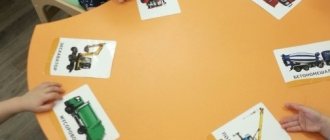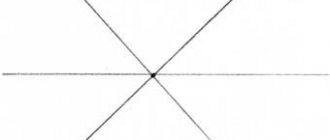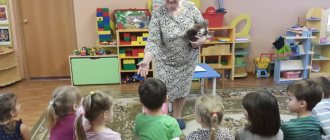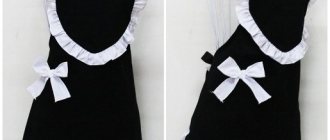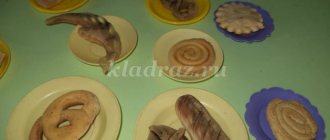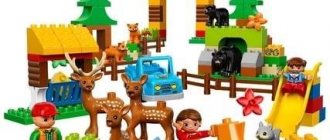Progress of the lesson:
Children gradually glue the cabin and body of the car.
Will our car be able to hit the road? (no, there are not enough wheels)
.
What wheel shape? (round)
.
What shape do you have left for the figures? (square)
.
Can we make a circle out of a square? (Yes)
.
A reminder from the teacher on how to make a circle out of a square.
Summary of a general lesson in the middle group Topic: “Types of transport” teacher of the MDOU Bershetsky kindergarten Yushkova Elena Viktorovna
Objectives: 1. develop the ability to classify types of transport according to the place of their movement - land, air, water; ability to reason and draw conclusions. 2. practice the skill of finding signs of differences and similarities between freight and passenger transport. 3. consolidate the words in the active dictionary: passenger transport, cargo transport, passenger transport, land transport, water transport, air transport. 4. broaden children’s horizons, cultivate observation skills.
Preliminary work: - observations of passing vehicles - outdoor games “Taxi”, “Train”, “Planes”, “Cars and traffic lights” - did/games “Guess by the description”, “What am I traveling in”, “Pick up the load to the car” ", "On the water, in the air, on the ground." Fun games using a remote control car, “Railroad”, a wind-up helicopter, boats for playing with water, a battery-powered airplane. - conversations with an examination of special-purpose vehicles - productive activities on this topic - role-playing games “We are going, we are going, we are going”, “A clever driver”, “A trip around the world”
Equipment: postal envelope with a letter from the village. Prostokvashino, illustrations with types of transport, 2 cars - cargo and passenger, classification table on the lexical topic "Transport", did/game "The Fourth Wheel".
Progress: The teacher informs the children that a letter arrived today: I wonder who the letter is from (reads) Children gr. “Teremok” kindergarten in the village of Bershet, st. Lenina, 9. From: village of Prostokvashino. Is reading:
"Hello guys! The postman Pechkin is writing to you. Sharik and Matroskin started building a new house and asked me to deliver them all the necessary materials by mail. I couldn't get it on my bike. Uncle Fyodor said that there are some vehicles that fly through the air and float along rivers. Tell us about this, help us figure out what kind of transport there is and what it is intended for. Waiting for an answer. Pechkin."
Guys, are you ready to help postman Pechkin. Is it possible to transport cargo on bicycles? What can you transport it with? (by car) What are the names of cars for transporting goods? (trucks) The teacher shows the children two cars and asks them to name which one is a cargo car. Points to another car - which one is this? (passenger car) What is it used for? (for transporting people). What are people called who are transported in transport (passengers). Let's see how the cars are similar and different: - a truck has a larger wheel than a passenger car; - in a cargo truck they transport goods - sand, building materials, logs...), and in a passenger car - people; — a truck has a body and a cabin, a passenger car has a passenger compartment; — who drives the vehicle? (chauffeur); — name the place of movement of this transport? (on the ground); - What kind of car will Pechkin use to transport the goods? (on cargo). Fizminutka A truck is carrying sand, the people are surprised, “What a miracle - miracles, there is sand in it under the clouds.” The teacher sits the children in front of the magnetic board. — Guys, tell me, what is transport? (these are means that are used to transport people and goods). We have already said that this transport moves on the ground, which means it is called... ground. — And if Pechkin encounters a river or sea along his route, what type of transport will help him on his way? (the teacher exhibits water modes of transport, the children name them) Everything that moves on water is called water modes of transport. - And if Pechkin comes across high mountains, what should he do then? (then he will travel by another type of transport, which is called... air). - And now, let's collect all the information for Pechkin in one letter, for this I propose to unite in three groups - agree on who will work with whom, and listen to the task: Pictures with different types of transport are laid out on the table. Group 1 selects only those pictures that relate to ground transport and enters them into the classification table. Group 2 select pictures of water transport and also put them in the table. Group 3 chooses an air mode of transport and fills out the table. The children classify the pictures into groups, the teacher asks: “Guys, tell me, how will Pechkin bring building materials to Prostokvashino?” (on a truck, dump truck). — What kind of car will Pechkin use to send mail? (on a special vehicle “Mail”) And what else will this correspondence be used to travel on? (by train, by plane, by ship). The children put everything they have prepared for Pechkin into an envelope and send it by mail.
Fizminutka We poured gasoline, got into the car, drove by car, and reached the river. Stop. U-turn. Steamboat on the river. The ship is unlucky, you have to get on the plane. The plane is flying, its engine is humming: ooh-ooh.
Have you rested? Now sit down comfortably on the carpet, let’s play the game “Fourth Wheel.” Summary of the lesson: - Guys, you liked collecting information about transport. Tell me, what do we call transport? (this is everything that can transport goods and people on land, by water and by air). And how transport is distinguished by place of movement: land, water, air. - Well done! You did an excellent job. Today we will go to the post office and send a letter to the village. Prostokvashino. And Sharik and Matroskin will be pleased when Pechkin delivers building materials to them.
Tasks :
1. develop the ability to classify modes of transport
according to the place of its movement - land, air, water; ability to reason and draw conclusions.
2. exercise the skill of finding signs of differences and similarities between freight and passenger transport
.
3. consolidate the words in the active dictionary: passenger transport
, cargo, passenger, land, water, air.
4. broaden children’s horizons, cultivate observation skills.
Progress of the lesson:
The teacher informs the children that a letter arrived today:
I wonder who the letter is from (reads)
Children gr.
"Fireflies"
kindergarten
"Kapitoshka"
. From: village of Prostokvashino. Is reading :
1) “Hello, guys! The postman Pechkin is writing to you. Sharik and Matroskin wanted to build a new house and asked me to deliver them all the necessary materials. I couldn't get it on my bike. Uncle Fedor said that there are some vehicles
that fly through the air and swim in rivers.
Help us figure out what kind of transport
there is and what it is intended for. Waiting for an answer. Pechkin."
Guys, are you ready to help postman Pechkin. Is it possible to transport cargo on bicycles?
What can you transport it with? (by car)
What are the names of vehicles for transporting goods? (freight)
The teacher shows the children two cars and asks them to name which one is a truck. Points to another car.
- Which one is this? (passenger)
What is it used for?
(for transporting people)
.
Let's see how the cars are similar and how they differ:
What parts does each car have? (steering wheel, wheels, engine, headlights)
.
The wheels of a truck are large, while those of a passenger car are (small)
…. ;
A truck has a body and a cabin, a passenger car has a passenger compartment;
A cargo truck carries goods - sand, building materials, logs, and a passenger car carries people;
Who is driving the vehicle
?
(chauffeur)
;
Name the location of this transport
?
(on the ground)
;
What kind of car will Pechkin use to transport the goods? (for cargo)
.
Ground mode of transport is divided into groups
. There is also a special and public one.
Who does public transport
?
(people)
transport is this?
?
(bus, tram, trolleybus)
Special for performing special work. Guys, which cars are classified as special cars? (Fire truck, ambulance, police car, gas service car.)
Fizminutka
Musical pause. “Bus”
(movements to music)
2) The teacher seats the children in front of the magnetic board.
We have already said that cars move on the ground, which means it is called... ground. We will schematically designate it as follows (the teacher shows the children a schematic representation of ground transport
).
Name another ground transport
(cars, bus, trolleybus, tram, ambulance, fire truck, etc.)
And if Pechkin encounters a river along his route, what kind of river does it look like? (the teacher exhibits water transport
, children call: boat, cutter, ship).
Name in one word everything that moves on water... water transport
.
water transport
like this (the teacher shows the children a schematic representation of water
transport
)
And if he encounters high mountains on his way, what type of transport will help him on his way?
(the teacher exhibits all
types of air transport
: airplane, helicopter).
Name in one word everything that moves through the air...air transport
.
Air is designated as follows (the teacher shows the children a schematic representation of air transport
).
And now everyone will take a picture depicting any type of transport
.
Task: break into groups
according to the schemes
(land, water, air
transport .)
While the music is playing, you move freely on the carpet, as soon as the music stops, you occupy the hoop, according to the scheme and your vehicle
.
(The game is repeated several times)
.
Lesson summary
:
Guys, did you like the lesson about transport
.
Tell me, what do we call transport
?
(this is everything that can transport goods and people on land, by water and by air). And how transport
is distinguished by place of movement: land, water, air.
Well done! You did an excellent job.
“Truck” applique for Postman Pechkin
and we will send both the letter and the application to the village of Prostokvashino.
Application: “Truck”
Equipment: blanks for cabins, bodies, windows, black squares; base for applique sheets A-5; glue, scissors, napkins.
